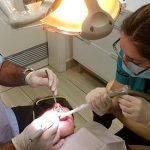Editor’s note: This is part of a new series spotlighting promising career paths that are filled with opportunity — yet don’t require a four-year college degree.
Amy Nguyen, 34, enjoys her plaque-busting profession because she “likes educating people on how to take care of their teeth. Dental health is extremely important — it promotes overall health.” After earning her dental hygienist degree and working for four years in the San Francisco Bay Area, where she grew up, she now earns $100,000 a year.
How she got there
Her academic path was “challenging,” she says, but not as painful as a root canal. Nguyen initially took prerequisite classes for her dental hygienist program at Chabot Community College in Hayward. She took in “microbiology, anatomy, physiology, chemistry, psychology, sociology, communications,” she says. She was subsequently accepted into the two-year, full-time Dental Hygiene program, where she earned her Associate degree and took courses such as radiology, pathology, patient management, head and neck anatomy, local anesthesia, and periodontics (aka gum disease). She says her favorite hours were spent on “clinic work, actually seeing patients.”
Nguyen’s total expenditure of $10,000 for her dental hygienist degree at Chabot included tuition, books, liability insurance, parking, vaccinations, gowns, gloves, masks, fees for state and national examinations, and an instrument kit with dental tools, such as an ultrasonic power scaler.
Landing her first job
“I got my license in September and I got my first job in November,” Nguyen says. She was hired by one of her instructors at Chabot; she says the helpful faculty members tend to keep students informed of openings. Employment for dental hygienists is enviable: the Bureau of Labor projects that the field will grow by 19 percent from 2014 to 2024. Chabot’s website claims “100% job placement of graduates who pass the State Board Examination is typical. This is expected to continue into the foreseeable future.”
The day-to-day grind
Nguyen presently works three days a week in Fremont, plus one day a week in Oakland, and once a week at the Native American Health Services in San Francisco. Wearing safety glasses, a surgical mask, and latex gloves to protect herself from infectious diseases, Nguyen meticulously inspects and cleans her patients’ teeth with a variety of hand, power, ultrasound, and laser tools. She seesaws floss between clients’ gnashers to remove food particles and snaps x-rays to detect cavities and jaw problems (like overbite). After relaying her discoveries to the dentist, she instructs clients in proper ongoing oral care, recommends products and, finally, bestows the ubiquitous free toothbrush and floss as a parting gift.
What special skills are needed to be a skilled dental hygienist?
Dexterity is essential, she says. Enormous, clumsy fingers lack the fine motor skills required to safely manipulate sharp tools into a fearful patient’s mouth. This is one reason why 95 percent of dental hygienists are women.
Critical thinking skills are crucial for correctly evaluating dental scenarios, and it’s important to be detail-oriented and adept at following specific rules and protocol. Last but not least, especially with the odontophobes, it’s imperative to be a compassionate person with strong interpersonal communication skills. “You have to be a ‘people person’” Nguyen says. “Because you’ll be constantly talking and working with a lot of different kinds of people.”
Why is dental hygiene such a fast-growing profession?
Baby Boomers are aging, and they’re keeping their original teeth (with considerable help). Cosmetic services like teeth whitening are also increasingly popular. Thirdly, dental insurance is more readily available; which creates millions more mouths to attend to.
The bottom line
Not every dental hygienist gets paid as brilliantly as Nguyen, but the average wage is $72,910 per year. Regionally, the crown for top pay goes to Fairbanks, AK, where dental hygienists earn $105,730 annually — which is nothing to scowl at.
What’s in store
Nguyen’s five- to 10-year plan is to earn a Bachelor of Science (a four-year college degree) in dental hygiene at California State University, East Bay. Why? Earning this diploma will make her eligible to teach at the more than 300 dental hygiene programs registered with the Commission on Dental Accreditation, a branch of the American Dental Association.
Does anything about dental hygiene just “bite”?
Nguyen admits the work can be “tedious” and it “can be hard on your back and hands… there’s a high risk of carpal tunnel because you’re holding such a small instrument.” Any other drawbacks? “Often you don’t get employed full-time at one office,” explains Amy, “so you don’t get any benefits.”
Flashing her pearly whites now, she brightens. “I always wanted to do dentistry,” she says. “I like smiles and teeth.”
This is part of a new series highlighting post-high school pathways to success for teens whose plans don’t include four-year college. These are careers with great growth potential that don’t require a four-year degree. Read our list of 42 up-and-coming careers that don’t require college (and 10 to avoid) and read our other career spotlights on radiology technologist, web developer, and director of photography.






